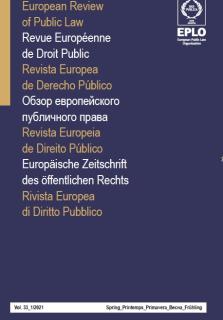
Multilevel Judicial Control of the European Common Values
in Pandemic Times
Judge of the European Court of Human Rights, Professor at the University of Lisbon – Faculty of Law
The present report analyses the topic of the multilevel judicial control of the European common values in the pandemic times. After clarifying the legal basis and the content of the European common values, settled in the European Convention on Human Rights and the Charter of Fundamental Rights of the EU, the author focuses on the restrictive measures and derogations of human rights adopted by governments, and other public authorities, such as municipalities, all over Europe. Taking into account the number of deaths due to the Covid-19 pandemic, the author questions whether the States have fulfilled their positive obligations to protect life and health and, in addition, whether they have respected the balance between the private interests expressed by the rights and the public interest – the control of the pandemic and public health. The author admits that to combat the pandemic or to prevent its effects, it may be necessary to restrict, among others, the right to liberty and security, the freedom of expression, the free movement of persons, the right to private life as regards data protection and surveillance, the right to respect for freedom and family life, the freedom of assembly and association, the freedom of religion, the right to work, the right to education, and the right to cultural freedoms. However, these restrictions must respect the constitutional, Convention, and Charter requirements. Without this respect they are unconstitutional, violate the Convention, and are contrary to EU law. Finally, the author sustains that a fair balance can only be achieved by a strong judiciary at each normative level and by a permanent and constructive dialogue between domestic and international courts.
Le présent rapport analyse la question du contrôle judiciaire multi-niveaux des valeurs communes européennes à l’ère de la pandémie. Après avoir précisé la base juridique et le contenu des valeurs communes européennes établies dans la Convention européenne des droits de l’homme et la Charte des droits fondamentaux de l’UE, l’auteur se concentre sur les restrictions et dérogations aux droits de l’homme adoptées dans toute l’Europe par les gouvernements et autres autorités publiques, comme les municipalités. Compte tenu du nombre de décès dus à la pandémie de Covid-19, l’auteur se demande si les Etats ont rempli leurs obligations positives de protéger la vie et la santé et, en outre, s’ils ont respecté l’équilibre entre les intérêts privés exprimés par les droits et l’intérêt public – le contrôle de la pandémie et la santé publique. L’auteur admet que pour combattre la pandémie ou pour en prévenir les effets, il peut être nécessaire de restreindre, entre autres, le droit à la liberté et à la sécurité, la liberté d’expression, la libre circulation des personnes, le droit à la vie privée en matière de protection et de surveillance des données, le droit au respect de la liberté et de la vie familiale, la liberté de réunion et d’association, la liberté de religion, le droit au travail, le droit à l’éducation et le droit aux libertés culturelles. Toutefois, ces restrictions doivent respecter les exigences de la Constitution, de la Convention et de la Charte. Faute de quoi elles sont inconstitutionnelles, violent la Convention et sont contraires au droit de l’Union. Enfin, l’auteur soutient qu’un juste équilibre ne peut être atteint que par un pouvoir judiciaire fort à chaque niveau normatif et par un dialogue permanent et constructif entre les tribunaux nationaux et internationaux.





















